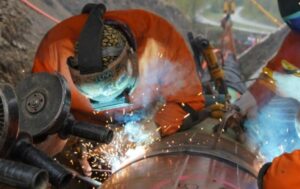
AI’s integration will trigger a global shift in job landscapes by 2030, causing displacement and spawning new roles, emphasizing the urgent need for skill adaptation in the workforce. Photo Credit: Pexels
In an era of technological innovation, the rise of Artificial Intelligence (AI) has sparked widespread debate and concern about its impact on the workforce. While AI promises efficiency, productivity, and transformative advancements across various industries, it also raises apprehensions about potential job displacement. The question on many minds is whether AI will take away jobs or create new employment opportunities.
Integrating AI and automation technologies into the workplace has undoubtedly reshaped job landscapes, leading to both displacement and the creation of roles. According to a McKinsey report, by 2030, between 400 to 800 million jobs globally could be automated. While these figures are staggering, history has shown that technological advancements create new employment and previously unforeseen opportunities.
The impact of AI on jobs is evident across sectors. Automation in manufacturing has significantly transformed production lines, reducing workforce requirements in specific roles. Tasks that were once performed exclusively by human workers, such as assembly line operations, have been replaced by AI-driven machines capable of working faster, accurately, and tirelessly.
However, it’s crucial to recognize that while AI may eliminate some roles, it generates demand for new ones simultaneously. For instance, the need for skilled AI engineers, data analysts, and cybersecurity experts has surged due to the growing reliance on AI systems. This trend highlights the evolution of the job market, emphasizing the importance of reskilling and upskilling the workforce to adapt to the changing demands of the digital age.
Service-oriented industries are not immune to AI disruption either. Once reliant on human interaction, customer service roles are increasingly being augmented or replaced by AI-powered chatbots and virtual assistants. While this shift raises concerns about job displacement, it also allows employees to transition into more complex roles requiring emotional intelligence, problem-solving, and critical thinking—skills that AI currently struggles to replicate.
Moreover, AI has revolutionized industries like healthcare and finance, enhancing diagnostic accuracy in medicine and optimizing financial operations through predictive analytics. These advancements improve efficiency and open doors for new career paths in healthcare technology and financial data analysis.
The apprehension surrounding AI’s impact on employment is understandable, especially in industries where routine tasks are prone to automation. However, experts suggest that while AI may replace certain job functions, it complements human capabilities, increasing productivity and innovation. According to a World Economic Forum report, while 85 million jobs may be displaced by 2025 due to technological disruption, 97 million new roles may emerge, emphasizing the potential for job creation in the AI-driven economy.
Amidst concerns of job displacement, the narrative often overlooks the potential for AI to create more fulfilling, safer, and higher-paying jobs. For example, AI augments healthcare professionals’ abilities by analyzing vast amounts of medical data to aid in diagnosis and treatment. This fusion of human expertise with AI’s analytical power enhances patient care and creates demand for specialized roles in healthcare AI.
Education and skill development are pivotal in navigating the changing job landscape. Governments, educational institutions, and private sectors must collaborate to equip individuals with the skills required to thrive in AI. Initiatives focusing on STEM education, data analysis, coding, and critical thinking are essential to prepare the workforce for the jobs of the future.
Businesses also bear responsibility for ensuring a smooth transition amid AI integration. Companies can invest in retraining programs for employees affected by automation, facilitating their transition into new roles that require uniquely human skills. Embracing a continuous learning and adaptation culture is crucial for employers and employees to thrive in an AI-driven economy.
The future of work is undoubtedly intertwined with AI, presenting a blend of challenges and opportunities. While AI may replace certain tasks, it has the potential to create new, more intellectually stimulating roles that leverage human creativity, emotional intelligence, and adaptability—qualities that remain irreplaceable by machines.
While the widespread adoption of AI may lead to job displacement in specific sectors, its overall impact on employment remains multifaceted. A proactive approach towards education, skill development, and a mindset embracing innovation will be instrumental in maximizing the benefits of AI while mitigating its potential adverse effects on the workforce. Ultimately, the coexistence of AI and human ingenuity may pave the way for a more dynamic, efficient, and diverse job market.
As society navigates the transformative impact of AI, the key lies not in fearing job loss but in leveraging the opportunities it presents to shape a more resilient and adaptable workforce for the future.




















